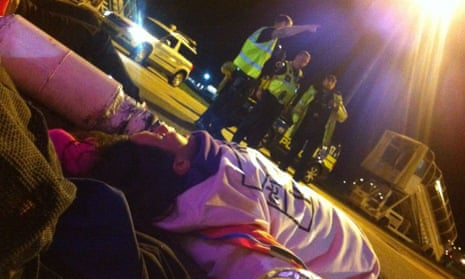Two of the activists convicted of terrorism offences for blocking the takeoff of an immigration removal charter flight at Stansted airport have spoken of their shock at the verdicts, describing the outcome as an “unprecedented crackdown on the right to protest”.
In a prosecution that has been condemned by human rights groups, Alistair Tamlit and Benjamin Smoke and the other members of the so-called Stansted 15 were convicted on Monday of endangering the safety of the airport in March 2017.
The court had heard how they used lock-on devices to secure themselves around a Titan Airways Boeing 767 chartered by the Home Office, as the aircraft waited on the asphalt at the airport in Essex to remove undocumented immigrants to Nigeria, Ghana and Sierra Leone.
After nearly three days of deliberations, following a nine-week trial, a jury at Chelmsford crown court found the defendants, all members of campaign group End Deportations, guilty of intentional disruption of services at an aerodrome. They were found guilty under the 1990 Aviation and Maritime Security Act, a law passed in response to the 1988 Lockerbie bombing.
The verdict – described by Amnesty International as a “crushing blow for human rights in the UK” – came after the judge, Christopher Morgan, told the jury to disregard all evidence put forward by the defendants to support the defence that they acted to stop human rights abuses, instructing jurors to only consider whether there was a “real and material” risk to the airport.
In legal arguments made without the jury present, which can now be reported, defence barristers had called for the jury to be discharged after Morgan gave a summing up which they said amounted to a direction to convict. The judge had suggested the defendants’ entry to a restricted area could be considered inherently risky.
In interviews with the Guardian, Tamlit and Smoke described their dismay at the news but insisted that their actions had been justified by the “brutal” and “racist” deportation policy which they were protesting against.
“We were charged with endangering life but we took the actions at Stansted to try to protect life. That point needs to keep on being put into the spotlight,” said Smoke. “As a result of what we did 11 people who were on that flight are still in the UK appealing against their removals. That’s something for us to hold on to.”
The group are hoping that they will be given non-custodial sentences, though the offences carry a maximum sentence of life imprisonment. Their legal team has started preparing an appeal.
The prosecution argued that their actions, which led to a temporary shutdown of Stansted, had posed a grave danger to the safety of the airport and its passengers.
Human rights organisations and observers had already expressed concerns over the choice of charge, which Kate Allen, the UK director of Amnesty International, likened to “using a sledgehammer to crack a nut”. Responding to the verdict on Monday, Gracie Bradley, policy and campaigns manager at Liberty, called the verdict a “grave injustice” and a “malicious attack” on the right to peaceful protest.
Dr Graeme Hayes, reader in political sociology at Aston University, was one of a team of academics who observed the trial throughout. The only previous use of the 1990 law he and colleagues were able to find was in 2002, when a pilot was jailed for three years after flying his helicopter straight at a control tower.
“This is a law that’s been brought in concerning international terrorism,” he said. “But for the last 10 weeks [of the trial], we’ve heard what amounts to an extended discussion of health and safety, in which the prosecution has not said at any point what the consequences of their actions might have been.”
In a statement released by End Deportations after the verdict, the defendants said: “We are guilty of nothing more than intervening to prevent harm. The real crime is the government’s cowardly, inhumane and barely legal deportation flights and the unprecedented use of terror law to crack down on peaceful protest.”
The protest took place on the night of 28 March 2017. The activists cut a hole in the airport’s perimeter fence, the court heard. Jurors were shown footage from CCTV cameras and a police helicopter of four protesters arranging themselves around the front landing gear of the aircraft and locking their arms together inside double-layered pipes filled with expanding foam.
Further back, a second group of protesters erected a two-metre tripod from scaffolding poles behind the engine on the left wing on which one of them perched while others locked themselves to the base to prevent it from being moved, the videos showed. In the moments before police arrived, they were able to display their banners, one of which said: “No one is illegal.”
As well as Smoke and Tamlit, Helen Brewer, Lyndsay Burtonshaw, Nathan Clack, Laura Clayson, Mel Evans, Joseph McGahan, Jyotsna Ram, Nicholas Sigsworth, Edward Thacker, Emma Hughes, May McKeith, Ruth Potts and Melanie Strickland, aged 27 to 44, had all pleaded not guilty.
They will be sentenced at a later date.
